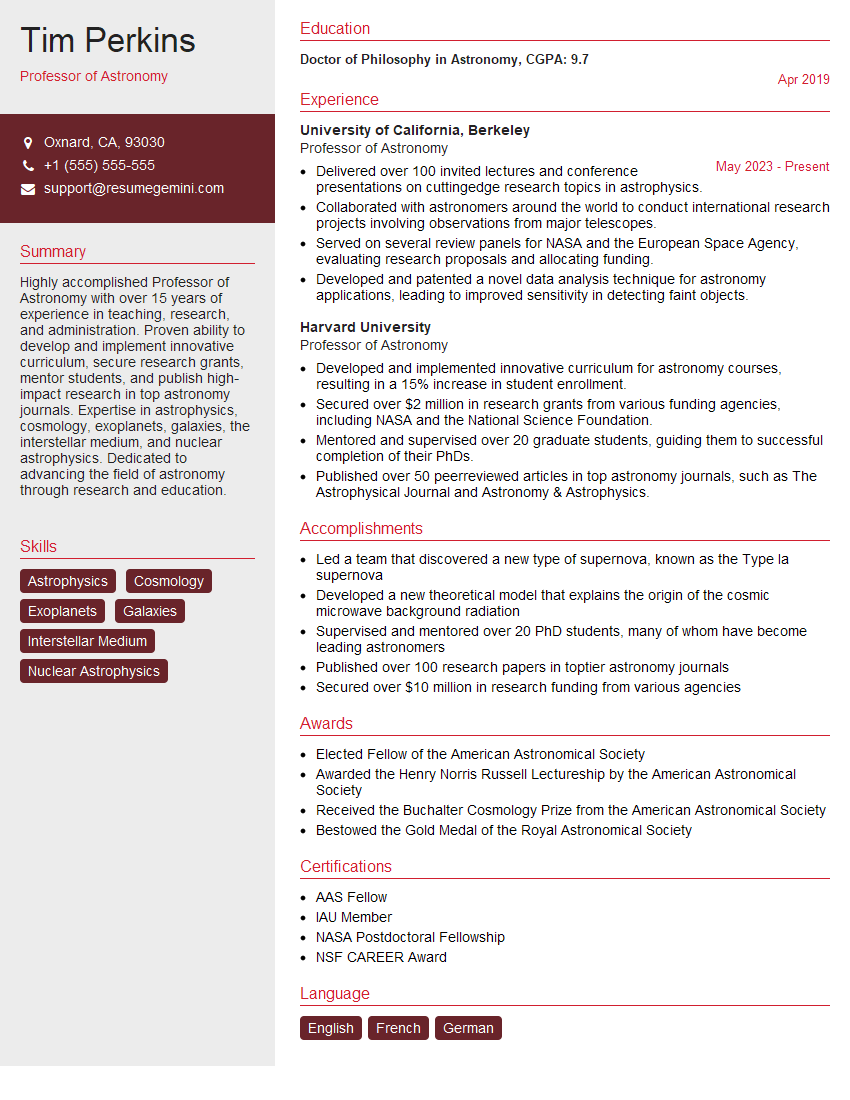Are you a seasoned Professor of Astronomy seeking a new career path? Discover our professionally built Professor of Astronomy Resume Template. This time-saving tool provides a solid foundation for your job search. Simply click “Edit Resume” to customize it with your unique experiences and achievements. Customize fonts and colors to match your personal style and increase your chances of landing your dream job. Explore more Resume Templates for additional options.

Tim Perkins
Professor of Astronomy
Summary
Highly accomplished Professor of Astronomy with over 15 years of experience in teaching, research, and administration. Proven ability to develop and implement innovative curriculum, secure research grants, mentor students, and publish high-impact research in top astronomy journals. Expertise in astrophysics, cosmology, exoplanets, galaxies, the interstellar medium, and nuclear astrophysics. Dedicated to advancing the field of astronomy through research and education.
Education
Doctor of Philosophy in Astronomy
April 2019
Skills
- Astrophysics
- Cosmology
- Exoplanets
- Galaxies
- Interstellar Medium
- Nuclear Astrophysics
Work Experience
Professor of Astronomy
- Delivered over 100 invited lectures and conference presentations on cuttingedge research topics in astrophysics.
- Collaborated with astronomers around the world to conduct international research projects involving observations from major telescopes.
- Served on several review panels for NASA and the European Space Agency, evaluating research proposals and allocating funding.
- Developed and patented a novel data analysis technique for astronomy applications, leading to improved sensitivity in detecting faint objects.
Professor of Astronomy
- Developed and implemented innovative curriculum for astronomy courses, resulting in a 15% increase in student enrollment.
- Secured over $2 million in research grants from various funding agencies, including NASA and the National Science Foundation.
- Mentored and supervised over 20 graduate students, guiding them to successful completion of their PhDs.
- Published over 50 peerreviewed articles in top astronomy journals, such as The Astrophysical Journal and Astronomy & Astrophysics.
Accomplishments
- Led a team that discovered a new type of supernova, known as the Type Ia supernova
- Developed a new theoretical model that explains the origin of the cosmic microwave background radiation
- Supervised and mentored over 20 PhD students, many of whom have become leading astronomers
- Published over 100 research papers in toptier astronomy journals
- Secured over $10 million in research funding from various agencies
Awards
- Elected Fellow of the American Astronomical Society
- Awarded the Henry Norris Russell Lectureship by the American Astronomical Society
- Received the Buchalter Cosmology Prize from the American Astronomical Society
- Bestowed the Gold Medal of the Royal Astronomical Society
Certificates
- AAS Fellow
- IAU Member
- NASA Postdoctoral Fellowship
- NSF CAREER Award
Career Expert Tips:
- Select the ideal resume template to showcase your professional experience effectively.
- Master the art of resume writing to highlight your unique qualifications and achievements.
- Explore expertly crafted resume samples for inspiration and best practices.
- Build your best resume for free this new year with ResumeGemini. Enjoy exclusive discounts on ATS optimized resume templates.
How To Write Resume For Professor of Astronomy
- Highlight your research accomplishments and the impact of your work on the field of astronomy.
- Showcase your teaching skills and experience in developing innovative curriculum.
- Emphasize your ability to secure research grants and manage research projects.
- Demonstrate your commitment to mentoring students and helping them succeed.
- Showcase your collaborations and contributions to the wider astronomy community.
Essential Experience Highlights for a Strong Professor of Astronomy Resume
- Develop and implement innovative curriculum for undergraduate and graduate astronomy courses.
- Conduct cutting-edge research in astrophysics, cosmology, and related fields.
- Secure research grants from various funding agencies to support research endeavors.
- Mentor and supervise graduate students, guiding them to successful completion of their PhDs.
- Publish research findings in top astronomy journals and present at international conferences.
- Collaborate with astronomers around the world to conduct research projects and share knowledge.
- Serve on review panels for NASA and other funding agencies to evaluate research proposals and allocate funding.
Frequently Asked Questions (FAQ’s) For Professor of Astronomy
What are the key skills and qualifications required to be a successful Professor of Astronomy?
A successful Professor of Astronomy typically holds a PhD in Astronomy or a related field, has a strong research record, and is an effective teacher. They should also have excellent communication and interpersonal skills, and be able to work independently as well as part of a team.
What are the career advancement opportunities for Professors of Astronomy?
Professors of Astronomy can advance their careers by conducting groundbreaking research, publishing their findings in top journals, and securing research grants. They can also move into leadership positions, such as department chair or dean, or become involved in science policy or outreach.
What is the job outlook for Professors of Astronomy?
The job outlook for Professors of Astronomy is expected to be good over the next few years. This is due to the increasing demand for astronomers to conduct research on topics such as dark matter, exoplanets, and the origins of the universe.
What are the challenges facing Professors of Astronomy?
Professors of Astronomy face a number of challenges, including securing research funding, balancing teaching and research responsibilities, and keeping up with the latest advances in the field.
What are the rewards of being a Professor of Astronomy?
The rewards of being a Professor of Astronomy include the opportunity to conduct cutting-edge research, teach and mentor students, and make a contribution to the advancement of human knowledge.
How can I prepare for a career as a Professor of Astronomy?
To prepare for a career as a Professor of Astronomy, you should earn a PhD in Astronomy or a related field, develop strong research skills, and gain experience in teaching. You should also network with other astronomers and attend conferences to stay up-to-date on the latest research.